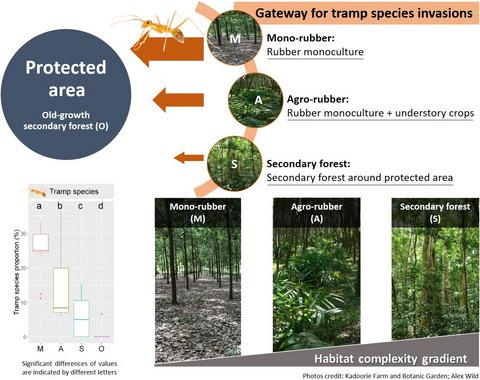当前位置:
X-MOL 学术
›
J. Appl. Ecol.
›
论文详情
Our official English website, www.x-mol.net, welcomes your feedback! (Note: you will need to create a separate account there.)
The ecological implications of rubber‐based agroforestry: Insect conservation and invasion control
Journal of Applied Ecology ( IF 5.7 ) Pub Date : 2020-05-10 , DOI: 10.1111/1365-2664.13642 Roger Ho Lee 1 , Chase Liu‐Wei Wang 1 , Benoit Guénard 1
更新日期:2020-05-10
Journal of Applied Ecology ( IF 5.7 ) Pub Date : 2020-05-10 , DOI: 10.1111/1365-2664.13642 Roger Ho Lee 1 , Chase Liu‐Wei Wang 1 , Benoit Guénard 1
Affiliation

|
- Protected areas are increasingly threatened by biological invasions, especially in tropical Asia where extensive areas of natural habitats have been converted to monoculture plantations. Such disturbance provides a gateway for exotic species invasions, highlighting an urgent need for cross‐boundary solutions to mitigate invasion impacts.
- Agroforests, with multi‐storied trees and crops resembling the complex structure of natural forest, are known to promote native species compared to monoculture plantations. Yet, our knowledge on their roles in controlling exotic species is limited to plant invaders, with effects on animal invaders still unknown. Given that protected areas are increasingly threatened by invaders from surrounding plantations, with a majority of them represented by insects, it is important to evaluate the effect of agroforestry practice, and mechanisms of associated management to control invasions.
- By using both taxonomic and functional trait‐based approaches, we studied leaf litter ant communities in 12 rubber monoculture (mono‐rubber), 9 rubber plantation with understory crops (agro‐rubber), 16 secondary and 12 old‐growth secondary forest plots in and around protected areas in Hainan, China. Sampled ants were further classified into groups based on their invasive potential (tramp vs. non‐tramp) to determine the ecological values of agro‐rubber.
- We found that despite mono‐rubber and agro‐rubber presenting similar species richness, the latter (a) supports species composition and functional diversity more similar to secondary forests and (b) reduces tramp ant species occurrence, a novel management incentive. Nonetheless, agro‐rubber is not comparable to secondary forest in terms of non‐tramp ant species composition.
- Synthesis and applications. Against the increasing threat of biological invasions, preserving natural forests in human‐dominated landscapes is crucial. Increasing the area of agro‐rubber at the periphery of protected areas as a proactive mitigation can, however, be perceived as an additional measure to reduce invasive species' establishment and spread across the landscape. Plantation‐based agroforestry has emerged as a potential management avenue and incentive for transforming monoculture plantations into a less ‘harmful’ alternative.



























 京公网安备 11010802027423号
京公网安备 11010802027423号